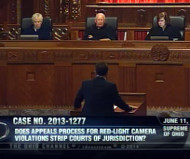Article from: www.thenewspaper.com/news/44/4438.asp
6/17/2014
Ohio Justices Skeptical Of Toledo Red Light Camera Program
Ohio Supreme Court hears oral arguments in challenge to photo enforcement administrative hearings.
 Justices seemed unconvinced as lawyers for Toledo and Redflex Traffic Systems of Australia made a pitch last week to preserve their business during oral arguments before the Ohio Supreme Court. Redflex mails $8 million per year worth of photo tickets, so Toledo's city attorney told the high court that there would be "untold consequences" if the appeals process set up to streamline adjudication of them were ruled unconstitutional.
Justices seemed unconvinced as lawyers for Toledo and Redflex Traffic Systems of Australia made a pitch last week to preserve their business during oral arguments before the Ohio Supreme Court. Redflex mails $8 million per year worth of photo tickets, so Toledo's city attorney told the high court that there would be "untold consequences" if the appeals process set up to streamline adjudication of them were ruled unconstitutional.
"So other than the loss of revenue -- is that the untold consequence?" Justice Paul E. Pfeifer asked.
On its own authority, Toledo set up a system to contest automated tickets, deemed civil violations, to an administrative hearing officer instead of a neutral judge. The Court of Appeals last year said this violated state law by cutting the municipal court entirely out of the process, even though state law gives this court jurisdiction over all ordinance violations (view decision).
"What stops you from just processing the ticket as a regular red light ticket written by an officer?" Justice William M. O'Neill asked. "You're telling me someone driving through a red light in Toledo in a residential neighborhood has committed a civil violation and not a criminal violation?"
Toledo's response was that the hearing officer's decision can be appealed to court of common pleas, but neither the attorneys for the city nor Redflex could say how a case would be filed in a municipal court, other than filing a brand new lawsuit that sues the city through a constitutional argument.
"I can't tell you the truth of the cause they would have," Toledo city attorney Adam Loukx admitted.
Toledo's arrangement allows the city to impose penalties, including the seizure of the photographed vehicle, without the motorist being able to defend himself with the due process protections of a court trial. The administrative hearing officer has a very limited role beyond simply determining whether the ticket recipient owns the photographed car.
"That's the problem I've had for about the past ten minutes here," Justice O'Neill said. "It's being advocated here, if you don't like what's happening just go file an action in municipal court. In the meantime, by the Toledo ordinance, it sounds to me that if I have not appeared they're going to go out and put a boot on my car."
Justice Judith L. French asked if the ticket sent to motorists included information on how to file a court appeal. It does not.
"Who advises the recipient of this ticket if they lose at the administrative level that they have the right to appeal to the common pleas court?" Chief Justice Maureen O'Connor asked. "The hearing officer doesn't advise them at the time they lose at that level?"
Toledo set up its photo ticketing system using home rule authority without the permission of the state legislature. The Ohio Supreme Court approved this use of home rule authority in a previous case (view decision).
 Justices seemed unconvinced as lawyers for Toledo and Redflex Traffic Systems of Australia made a pitch last week to preserve their business during oral arguments before the Ohio Supreme Court. Redflex mails $8 million per year worth of photo tickets, so Toledo's city attorney told the high court that there would be "untold consequences" if the appeals process set up to streamline adjudication of them were ruled unconstitutional.
Justices seemed unconvinced as lawyers for Toledo and Redflex Traffic Systems of Australia made a pitch last week to preserve their business during oral arguments before the Ohio Supreme Court. Redflex mails $8 million per year worth of photo tickets, so Toledo's city attorney told the high court that there would be "untold consequences" if the appeals process set up to streamline adjudication of them were ruled unconstitutional.